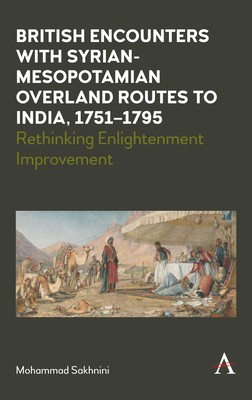
- We will send in 10–14 business days.
- Author: Mohammad Sakhnini
- Publisher: Anthem Press
- ISBN-10: 178527936X
- ISBN-13: 9781785279362
- Format: 15.2 x 22.9 x 1.9 cm, hardcover
- Language: English
- SAVE -10% with code: EXTRA
British Encounters with Syrian-Mesopotamian Overland Routes to India, 1751-1795 (e-book) (used book) | bookbook.eu
Reviews
Description
As this book shows, different British responses to the material conditions of the Arab region and its inhabitants were mapped onto some British debates about the viability of modern commercial societies and the apparently intractable problem of securing a more benign relationship between material advance and virtue, modernity and traditions, improvement and backwardness. These debates reflected some significant transformations of the period: fears of French invasion during the Seven Years Wars, Enclosure Acts and the Jacobite Rebellion, the corruption of East India Company, the crisis of the American colonies and French Revolution, and the debate over slavery of the 1790s. En route, Britons raised concerns about a host of religious, political and ethical questions that troubled eighteenth-century Britain: Is moral corruption a necessary price a society has to pay in return for living in a materially advanced state? Do people need to honour traditions and religion in modern commercial society in which people have never been freer? Can one find virtue and morality in commercial society? Can an advanced and enlightened society tolerate religion? How can it be that a wealthy society also has poor and dispossessed people who live in workhouses? How is it possible that a society which respects Enlightenment values of freedom and liberty also practices slavery and colonises other societies? European travellers in the Levant often found themselves confronting these questions, especially in a region known for being grand and great in the past but barren and full of ruins in the present.
EXTRA 10 % discount with code: EXTRA
The promotion ends in 16d.16:37:45
The discount code is valid when purchasing from 10 €. Discounts do not stack.
- Author: Mohammad Sakhnini
- Publisher: Anthem Press
- ISBN-10: 178527936X
- ISBN-13: 9781785279362
- Format: 15.2 x 22.9 x 1.9 cm, hardcover
- Language: English English
As this book shows, different British responses to the material conditions of the Arab region and its inhabitants were mapped onto some British debates about the viability of modern commercial societies and the apparently intractable problem of securing a more benign relationship between material advance and virtue, modernity and traditions, improvement and backwardness. These debates reflected some significant transformations of the period: fears of French invasion during the Seven Years Wars, Enclosure Acts and the Jacobite Rebellion, the corruption of East India Company, the crisis of the American colonies and French Revolution, and the debate over slavery of the 1790s. En route, Britons raised concerns about a host of religious, political and ethical questions that troubled eighteenth-century Britain: Is moral corruption a necessary price a society has to pay in return for living in a materially advanced state? Do people need to honour traditions and religion in modern commercial society in which people have never been freer? Can one find virtue and morality in commercial society? Can an advanced and enlightened society tolerate religion? How can it be that a wealthy society also has poor and dispossessed people who live in workhouses? How is it possible that a society which respects Enlightenment values of freedom and liberty also practices slavery and colonises other societies? European travellers in the Levant often found themselves confronting these questions, especially in a region known for being grand and great in the past but barren and full of ruins in the present.


Reviews